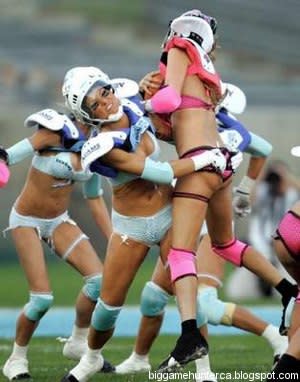Why the Lingerie Football League coming north is a bad idea

The Lingerie Football League announced Wednesday that it will put an expansion franchise into Toronto in 2011 and plans to follow that by creating an entirely Canadian six-team LFL with teams across the country in 2012. For those unfamiliar with the LFL, it's a league that plays seven-on-seven tackle football, but the football product is often quite secondary to the athletes, who are selected at least partly based on their perceived physical beauty and are attired in bras and panties (with shoulder and knee pads and helmets as the lone concessions to safety). Of course, this is already stirring up some controversy; as Allison Cross reports in the above Toronto Stararticle, several women are already upset about this:
Judy Pfeifer and her 14-year-old daughter were horrified to hear of the sport's imminent arrival.
"What's next, thong soccer?" said Pfeifer, who lives in Toronto. "I don't think this does much for gender equality."
Her daughter, Zoë Grace, who plays soccer and volleyball, said she's perfectly happy wearing shorts and T-shirts like her male counterparts.
Julie Veilleux, a translator who splits her time between Toronto and Montreal, wasn't impressed either.
"I don't doubt these women are athletes but it makes being good looking a prerequisite for playing a sport," said Veilleux, 26. "A lot of girls already don't feel comfortable being in sports."
I think Veilleux (disclosure; she's a Twitter friend of mine) makes an excellent point there. I'm all in favour of more opportunities for women to play sports at the highest level possible, and I spend plenty of time writing about women's sports at the university level. Football is a sport where women historically haven't received a lot of opportunity, and I'd love to see more chances for women to play football at high levels of competition. The LFL (its 2008 championship game, the Lingerie Bowl, is pictured above right) isn't that, though, and it's debatable whether it even really qualifies as a sport.
Yes, the league plays actual games, but the focus on scanty attire over sporting quality means the games tend to be more about leering than appreciating the athleticism involved. In essence, the league endorses Toronto radio host Bob McCown's ridiculous comments about how men only watch women's sports based on the attractiveness of participants rather than the level of competition, and its product takes those comments to a new level by presenting a sport that's openly not really about sport, but rather about a chance to leer at women in their underwear. The women who play are still quite talented, they have every right to show off their bodies if they want to, and it's good to see women getting the chance to make a living as professional athletes, but I don't think this league is a positive thing for women or Canadian society as a whole. It has potential to make an impact, but that impact isn't necessarily for good.
In my mind, the LFL sends several extremely negative messages to its players, its fans and the public in general. First, the league seems to be telling women that it's looks that matter, not athletic ability. LFL founder and chairman Mitchell S. Mortaza told Cross that "These are women who are athletic but also very beautiful and very marketable," and he didn't deny that the league picks players based on attractiveness. By sending this message, Mortaza and his league are clearly indicating that they care more about how their players look than how they play, and that's an idea that could negatively influence women's sports at all levels. Second, the league's selection of only the women they find attractive could lead to body-image issues for girls; I'd hope that most kids are smart enough to realize that they don't need to look like supermodels to find success, but this league is clearly telling people that beauty (and a willingness to flaunt it in public) is the path to the top. Third, the league's informing its fans that women's sports are only to be enjoyed for the attractiveness of the athletes involved, and fourth, it's telling the larger population that women's sports are only valuable if the women involved are portrayed as sexual objects. That's a philosophy that could have significant damaging repercussions for women's athletics at all levels.
It's not like the LFL is going to be much competition for the CFL even if it gets off the ground. I'd venture the crossover between the two leagues' fanbases is pretty limited, and I'm quite positive the LFL isn't going to achieve the ratings, attendance or coverage the CFL gets in Canada any time soon. Thus, the CFL probably doesn't need to have a position on the LFL one way or another (Update: and they don't at the moment; league director of communications Jamie Dykstra told me Wednesday they have "no position at this time"), as it's not something all that likely to impact it in any appreciable way. Still, this is something that could matter for the direction of sports in Canada, and particularly women's sports. Everyone's welcome to watch and follow whatever they want, and if that happens to be scantily-clad women playing football, fine. Personally, I'm much more interested in women's football along the lines of the WWCFL (Western Women's Canadian Football League), an existing seven-team women's tackle football league that's playing real football in real uniforms and treating its participants as athletes, not sex objects. That league's just getting off the ground, but to me, it sounds far more promising than the LFL.

 Yahoo Sports
Yahoo Sports 

